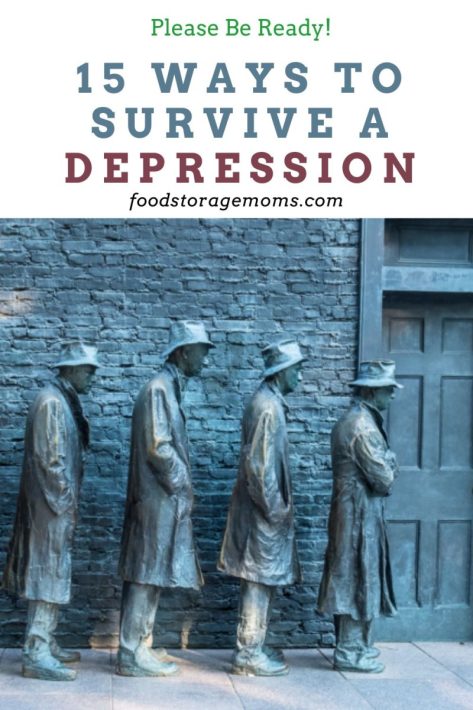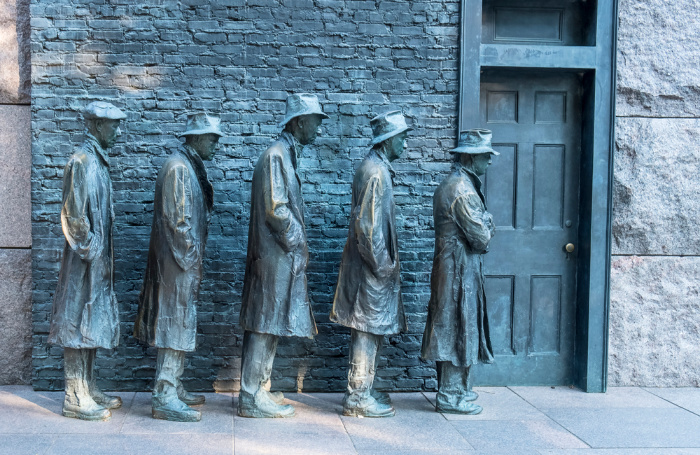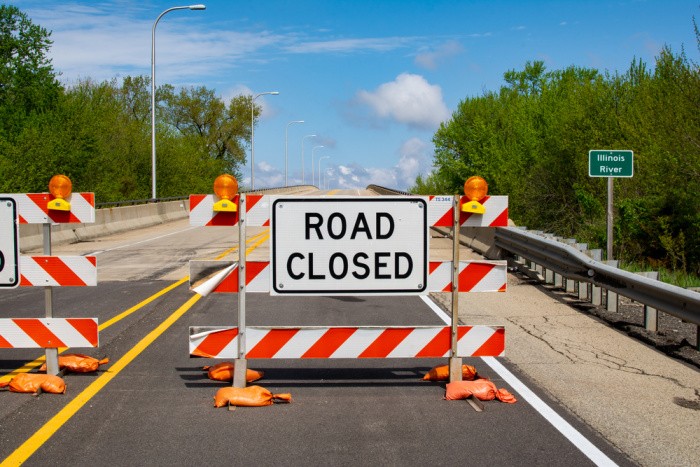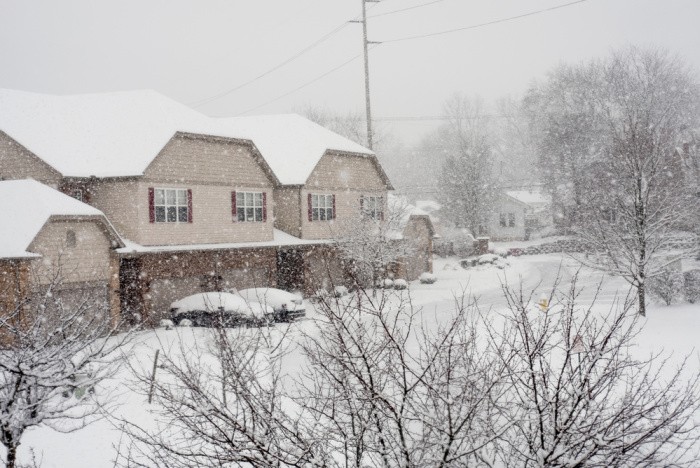15 Ways to Survive a Depression
I have 15 ways to survive a depression today. We must be ready, my friends. The Great Depression that struck the heart of America in the 1930s was crippling, to say the least. A countless number of Americans lost their jobs, homes, loved ones, and everything you and I often take for granted today.
Well, the mid-term election has been held, and although most final results are in, control of the congress is still up in the air until some house and senate seat results that are running very tight ultimately are resolved by vote counts or run-off elections. Much of the debate during the recent election campaigns centered on the economy and how best to get it back on track.
Recent dialogue by some economists that based their concerns on past history and detailed analysis, centered on the possibility of a deep recession, often the forerunner of a depression. The stock market has seen some volatility the past few months, there are “we are hiring” signs at thousands of establishments, and the prices of things seem to be going up more each day.
While we would naively like to believe that a deep recession or even a depression could never happen again, we would only be fooling ourselves. Things that happen in history have a tendency of repeating themselves because we choose to hope for the best or to sweep the past under a rug.
So ask yourself, “Am I prepared if the economy were to crash again?” If the answer is no, what are you going to do about it? Learning from a recent or past economic downturn, here are 15 ways to help you and your loved ones survive during devastating times.

How to Survive a Depression
1. Work Multiple Jobs – Have Additional Education and Training
The last time America suffered economic depression, it’s estimated that over 13 million hard-working men and women lost their jobs. That equated to over 25% of the available workforce at the time.
They found themselves having to seek out multiple jobs wherever they could find them to help make ends meet. Unfortunately, the same could happen if an economic crisis were to sneak up on us again.
Having more than one source of income would help you stay ahead when rough times come. You could even start now. Consider picking up a part-time job that you actually enjoy.
If you were to lose your full-time job due to a layoff, hopefully, that part-time job will still be there. Consider getting trained in something new so you’re prepared to take on a different job, if necessary.
Having a college education isn’t a guarantee of continued employment, but it certainly gives you a leg up on others who may be seeking employment. Also, having training and certification in the “trades” like plumbing, carpentry work, or as an electrition gives you that extra level of competence and confidence that you can stay gainfully employed.
One of the most sought-after employment opportunities right now is in nursing. Think about it, there will ALWAYS be sick people who need professional care. If you think high-tech training will protect you at any given job, just look at what’s happened this week on Twitter based on Elon Musk’s recent takeover and related layoffs. Weigh your options and pick something that you like and has growth and stability potential.
2. Control Your Spending Now/Avoid Debt
Another financial way of surviving an unforeseeable downturn would be by controlling your spending habits and do not take on more debt now.
During an economic collapse, not only will you be hurting, but the banks will be suffering as well. The banks won’t care about your predicament.
They’ll be much quicker about liquidating any collateral that they can get out of you, even if you’ve had a good payment history in the past. If you do find yourself in a bind, don’t put your head in the sand, go visit that banker and see what can be worked out.
If you have credit card debt, student loan debt, monthly home mortgage, or car payments, get them paid off as quickly as you can.
While you’re doing this, don’t take on any more debt. Save that extra money, so that when times become hard, you have financial options to fall back on. In an economic downturn, that line of credit or credit card may come in handy in the short term.
3. Unity Through Community
Having a community, like friends, family, or a church organization, will be a huge blessing and could provide some level of relief during stressful financial times. Not only can everyone pitch in and help each other with their financial and basic needs, but they are also able to protect one another from getting into further problems.
Trying to go solo in a crisis drastically increases the likelihood of your family not surviving the roughest circumstances. If you need help, don’t be afraid to ask, and if you have the resources, don’t hold back from extending a helping hand. The old saying, “what goes around, comes around” applies to positive actions you take to benefit others.
4. Stretch Your Meals/Supplies
While it might be uncomfortable, and not what you’re used to, you’ll have to learn how to ration your food and supplies during tough times. Cutting back on your consumption and not allowing anything to go to waste will be paramount.
When supplies can no longer serve the function of what they were originally intended for, is there another purpose you can use them for? “Waste not want not” is another appropriate saying and approach in difficult times.
5. Prepare Mentally Beforehand
It’s going to be extremely hard for wealthy people to cope with their change in status when their whole world comes crashing down. It’s going to be challenging for the middle-class and struggling citizens to keep their heads on straight during this time too.
You have to mentally prepare yourself so that your family will keep fighting no matter what. Learn to be a more stoic person now, so that you can battle through anything. Learning to be more self-reliant is part of the formula for success in challenging circumstances. If you have a plan, you work that plan and find comfort and confidence in doing so.
6. Invest in other Currency/Gold
When the value of the US currency comes crashing down, how are you going to be able to afford anything? Choosing to invest in other currencies now could have its own set of risks, but could prove rewarding when the dollar becomes unstable or nearly useless. Owning gold, silver, or other precious metals or gems will be invaluable in a crisis. Do your homework and make sure you are investing in areas and products that have a reasonable risk and stronger upside.
7. A Plan for Shelter
What are you going to do when the bank has taken important items you’ve pledged as collateral, even the home you’ve lived in for so many years? You have to have a backup plan. Do you own a tent or better yet, a family or close friend that would take you in?
I used to own my own mortgage company. I learned very early on that making your mortgage payment each month is probably the most important payment any family makes. It’s very hard to qualify for a home loan if you’ve had delinquent payments on a prior mortgage. Protecting where you live is so critical in good and bad times.
8. Clean Water
While you might be able to survive for a while without food, your body will only sustain itself for a few days without water. When a crisis hits, store shelves will very soon be wiped out of stock on gallons and bottled water.
Don’t be caught in this predicament. Plan ahead of time, and begin stocking up on water now. It would also be wise to have several water filters on hand to keep your water pure.
9. Canned and Storable Foods
Most families only have enough canned and storable food in their pantries that would last their family for a few weeks or less.
Plan ahead of time by stocking up on these items so you don’t have to head to the grocery store while it’s being ransacked as people in a panic try to provide the essentials for their families.
I have many posts in my archive relating to food and water storage. Check them out and put your family’s storage plan together TODAY.
10. Stockpile Medication
Another service that could vanish in an economic meltdown would be quality healthcare. Go the extra mile now and stockpile any medications that you think would prove vital for your family during hard times, especially those you take on a regular basis. If shelf life is an issue, consider how best to store the prescriptions for a longer period.
Many insurance plans now provide prescriptions in 90-day quantities, or even longer. The next time you get your doctor to authorize a consistently taken medication to be filled, ask for a larger quantity, it doesn’t hurt to ask.
11. Stockpile Goods
Prepping your home with goods and supplies that are imperative for everyday life will be a huge weight taken off of you. This includes items like toilet paper, toothpaste, trash bags, and seasonal clothing. Just imagine living without those basic necessities for a long period of time.
You don’t have to fill that inventory in one visit to the store, pace yourself and your finances and purchase things over time as your budget will allow.
12. Warm Clothing
You also never know when this type of calamity might happen and the effects that it might have. If you find yourself without a warm place to stay in the middle of winter, what then? Make sure that you have plenty of warm and dry clothing for the long season.
13. Learn to Hunt/Garden
Learning to hunt and garden will prove priceless during a collapse. Unfortunately, hunting would only be a solution for a short period of time, with all the hunters roaming about, but a garden would be a godsend. Start now to figure out where you can place the garden, what kinds of plants grow well in your location, where to get the seeds or seedlings to plant next spring, how to get water to that area in your property, read up on gardening skills so you’re ready to go.
Again, I have a series of posts where I outline what can be planted during the year based on your location’s “zone.” Check-in my archives under “what to plant in ——-” and put the month so you can follow the series.
14. Ax, Saw, or Other Tools
How will you keep your family warm if you have no way to heat your home or shelter? Having an ax, a saw, and other tools can help you cut down wood to start a fire. Multi-tools will also be imperative to have to help with basic survival skills.
We used to have a home we heated during the winter with a fireplace insert. We made it a family outdoors event to go into the mountains and gather wood. We slept in a tent, cooked our meals over an open fire, and worked hard during the day. It saved us money on utility bills and helped teach our girls about making sacrifices and being self-reliant.
15. Self-Defense
The question is not a matter of if, but when will the next deep recession or depression happen. Have you taken the proper precautions in coming up with self-defense?
While you might have wishful thinking and try and see only the good in people, crime could run rampant during this time. We are already seeing an uptick in crime across the country, just think how it will be during challenging times!
Calling 911 for an emergency will be a joke. Owning a firearm or other form of protection might very well save your family members’ lives.
What Caused the Great Depression?
Historians may have some different thoughts about the contributing factors that helped to bring on the Great Depression, but most seem to agree on a few key global influences that helped spawn the catastrophe. Here are some thoughts to ponder as we compare our current global environment with what existed during the 1920s and 1930s:
The Economy During the Roaring ’20s
The end of World War I in November 1918 prompted economies throughout the U.S. and Europe to gear up for better times. Production of cars and some new inventions like the radio were examples of things people wanted and purchased in mass, many being acquired through credit. With so many industries that had been quiet or redirected during the war now free to increase production, by the end of the 1920s, many items had been overproduced and companies were cutting back.
The cutbacks resulted in layoffs and oversupply. To sell inventory, many companies were forced to reduce prices, making profit generation a real challenge. The layoffs prompted families without incomes to miss on payments, including on the loans they’d used to purchase some large ticket items, putting pressure on lending institutions.
The Stock Market Crash of 1929
The stock market had been very “hot” all during the early part of 1929, setting records for the value of stocks. Part of the hot nature of the market was due to how many stocks were being purchased at that time without government oversight. Many investors were buying “on speculation” or “on margin,” meaning they borrowed money to do so. People thought that with the strong market, their stocks would go up in value, so they were willing to borrow money to make the stock purchases, and the banks were willing to provide the loans.
As the market started to “cool” during September and October of 1929 investors became nervous and started to pull their money out of the market. If they did it early, they had the funds to pay off the loans, if not, they were left short and couldn’t pay off those loans. The “sell” trend become so prevalent that the value of stocks in general dropped significantly. On Thursday, October 24, 1929, the market dropped right from the opening bell, causing a real panic in the investment community. That day was called Black Thursday.
By the following Tuesday, called Black Tuesday, things got so bad that the stock market crashed, with stock values dropping by over 12% in value in one day. Investors lost billions of dollars and couldn’t pay back their loans, and the companies relying on the investments to keep running, started to not only lay off employees, but many ended up going out of business. You could say that the economy was devastated, and the country entered what we call today the Great Depression.
There Were Hundreds of Bank Failures
The stock market crash set off a chain of events as challenges in financial markets rippled throughout the economy. When people started to hear about banks failing, they decided to pull what money they did have out of their banks. You may have heard of the term, Run on the Banks, and that’s what happened. With the banking panic, there were lines out the doors of the banks as depositors waited to pull out their funds, further weakening the overall financial system.
Of course, the banks didn’t have all that money in cash, so they had to close their doors. Bank deposits are the lifeblood of the banking system. With bank customers unable to pay on their loans, and wanting to pull out their deposits banks just couldn’t stay in business. During late 1929 there were nearly 700 banks that failed, with over 3,000 going out of business in 1930. The commercial banks in this country were decimated.
Reduced Consumer and Commercial Spending
Now we see families with worthless investments, their life savings either reduced or eliminated, and bank tightening credit such that consumers and businesses couldn’t borrow. Significant spending then ground to a halt, causing further inventories to accumulate, additional layoffs with unemployment soaring to more than 25%, and additional weakening of the economy.
Foreign Economic Policy with Europe
With the economy in the U.S. showing significant challenges, and weakness with our trade partners in Europe, countries tried to protect their own interests. That meant both the U.S. and Europe passed trade tariffs that restricted exports in both directions. During the next five years from 1929 to 1934 world trade dropped by about 66%. Without the ability to sell products overseas, American companies continued to show weakness in profits, and inventories continue to balloon.
Drought Conditions
Compounding problems were the drought being experienced in the mid-west and some southern states. The drought got so pervasive that many states experienced severe dust storms and the area became known as the “dust bowl.”
Thousands of farmers couldn’t plant, water, or harvest crops. Many of those farm families tried to relocate to other states, including California. A famous book written by author John Steinbeck called “Grapes of Wrath” detailed the travails of families who left their homes looking for a better life. The describes the makeshift shanty towns that became their new normal.
What kinds of actions were taken to improve the American economy?
Since the Great Depression started on his watch, President Herbert Hoover faced a lot of political pressure from all sides. Since President Hoover didn’t step up and take control of the situation, President Franklin D. Roosevelt was elected based on promises made to turn the economy and the country around. He referred to his efforts as the New Deal, and it really did involve a number of important new agencies and policies designed to improve conditions for all Americans.
The New Deal included a number of new laws and executive orders that created or upgraded many agencies and initiated a number of programs designed to benefit individuals, companies, and the economy in general. It did require an infusion of funding and increased the national debt. But, the populace at large seemed to appreciate the initiatives and got behind the effort.
The New Deal initiatives included agencies like the Social Security Administration (SSA), Reconstruction Finance Corporation, Federal Deposit Insurance Corporation (FDIC), Export-Import Bank, and worthwhile programs like Civilian Conservation Corps (CCC), Tenessee Valley Authority, Historic Sites Act, and so many more.
I don’t have room on my blog to list all the initiatives or provide detailed information you might find interesting. You can Google an inquiry regarding the New Deal and all the things that were included so you can do your own research as you feel inclined.
Final Word
These are 15 ways you can prepare and survive if depression were to ever strike again. Wall Street, interest rates, and the banking system crash in the United States are all a possibility. It’s a good idea to be prepared in the short term, and long term.
Are you prepared for this scenario? What other ways have you prepared to survive this type of event? To survive the great depression again, you’d need these tips. May God Bless this world, Linda
“Prepare Your Family For Survival” by Linda
Copyright Images: Great Depression Depositphotos_164094144_S by chiyacat






















Linda,
After this last Tuesday and the following fiasco, we may be closer to a Depression than we know. I hope more people are preparing, Unfortunately, in our circle of acquaintances, I there seem to only be a few. But then again, I keep quiet or downplay our depth of preparation since I will fight anyone who tries to steal from us. I hope all of your readers keep preparing and preparing well for a long duration of hardship. I pray daily for our country.
I did read that 10% of Americans are into preparedness now. The more that get onboard the less risk there is for those of us who do prepare but it still remains high because of the lack of societal values
Hi Matt, 10%, wow, that’s the same number for Utah! We can’t take care of everyone, I sure hope that 10% goes up. Utah has been at 10% for years. YIKES! Linda
Ten percent is surprising but should be much higher. Hopefully more will get on board quickly. Thanks for the info.
Hi Harry, you are so right. I’m also concerned about what is going on in our country, we must be prepared because no one will take care of us except ourselves. I don’t think some people understand what is coming down the pipeline. I hope I’m wrong, but we must pray every day for our country. We must be prepared, there is no question. Linda
Just make it’s physical precious metals. Some companies are issuing “certificates” which is meaningless in a collapse.
I lean more to the less costly PM of lead.
Hi Matt, I had to think about that for a minute, then I got the giggles. You are so right about what we need. Linda
The Depression is coming at the turn of the decade. 2030-2036 will be the worst years. I follow ITR Economics. They are a non-biased company who want to help people and businesses prepare. They have a bunch of (free) articles on their blog pertaining to the upcoming Depression, why it will happen, what it will look like, etc. Many of their ways to prepare line up with yours. Very interesting information and they continue to motivate me to protect my family. I just thought you might like another source to reference for your personal knowledge. Thank you for the very informational article!
HI Amanda, oh, thank you for this website, we really are headed towards a depression, I just hope people will realize how bad it’s going to be. Great tip, Linda
Just keep preparing! I got 2 turkeys today -47 cents a pound and hamburger for $1.87 a pound! Got some canning to do tomorrow!
That’s a great price for Turkey! Just took my mom shopping this morning and seen it for $2lb at Wallie World
We were in “the city” yesterday and went to Walmart because everyone said they had great turkey prices – not!! Lots of empty freezers and the turkeys they did have were almost $2.00 a pound, passed. Did get canned veggies for 50 cents apiece!
Our little local grocery store had the cheap turkeys – I’m thinking of going back for 2 more!
Hi Beth, canned veggies for 50 cents, love it! Empty freezers, that is not good. Linda
Hi Matt, I picked one up today from Wally World for $1.18 a pound. I only wanted a small one (11 pounds). They were .99 cents a week ago. $2.00 yikes! Linda
One thing we all need no matter how well prepared we think we are is a community of like-minded souls. Pulling away from the greater world at our doors means your preps will hold only as long as you remain awake. Also we can all learn from books even if we haven’t mastered specific skills. Do not rely on the presence of you-tube videos or ebooks. And most important, it is never too late to build a relationship with the Lord, who has helped others cope for generations.
Our smiths has turkey for $0.69 a lb. and that is this weeks ad. Will get several and keep them for Christmas, New Years, and other holidays. May get some quart jars and try my hand at canning the extra Turkeys,
Bacon is only $3.99# 5# Potatoes are only $0.97
We will also be going to Sam’s Club to see what we can get there,
Our smiths has turkey for $0.69 a lb. and that is this weeks ad. Will get several and keep them for Christmas, New Years, and other holidays. May get some quart jars and try my hand at canning the extra Turkeys,
Bacon is only $3.99# 5# Potatoes are only $0.97
We will also be going to Sam’s Club to see what we can get there, What I saw was really expensive and we don’t go there very much because we can go to wally world and get things cheaper.
Sprouts has some great sale items also. Will just have to see what we can get there also
We are working further on the stocking up and resources. We haven’t been able to determine the best was to keep money safe….. Bank CDs, US Savings Bonds??? We have no debt, but cash? Precious Metals?? How safe are banks? Insurance policies? Everything I read gives a different perspective.
Hi Chris, I understand your frustration. We had some money saved in a savings and loan that went belly up many years ago. They had what’s called a RUN on the bank. Someone leaked on the news that the “bank/savings and loan” was in trouble. By noon, the bank had so many people trying to withdraw money the FDIC shut them down. Here’s the article, https://www.deseret.com/1988/4/1/18764211/foothill-financial-sues-ksl-charging-its-story-caused-run Yes, that was back in 1988, but it still brings back bad memories for me. It’s my understanding that some insurance companies cannot cover the damages and some of the natural disasters and are now insolvent. https://www.cbsnews.com/miami/news/sixth-florida-property-insurer-declared-insolvent/
I really don’t know who to trust right now. We must be cautious that’s for sure. Linda
An aside from Learning How to survive a Depression…… My daughter in law has been learning frugal ways as she and my son not only prepare for what ever is coming, but to teach their boys a better way of living. Katie found a book on-line for me, but didn’t realize until it came, not only was it used, but it had am inscription! I told her that was wonderful because it means it has history…….the book????……..WE HAD EVERYTHING BUY MONEY……Priceless memories of the Great Depression. I am enjoying ever page, and am grateful for the very thoughtful gift.
HI Chris, Oh I love that idea for a gift!!! LOVE IT!!! Linda